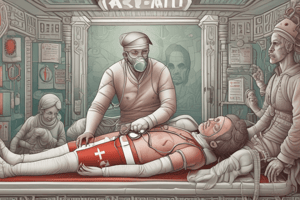Podcast
Questions and Answers
What should be done if the casualty is unconscious?
What should be done if the casualty is unconscious?
- Turn the head to one side and place him on his back. (correct)
- Raise the head higher than the body.
- Keep them sitting upright.
- Place the casualty on his back with a pillow.
What is the primary action needed if there is obvious bleeding?
What is the primary action needed if there is obvious bleeding?
- Ensure the casualty is warm.
- Apply direct pressure to stop the bleeding. (correct)
- Immediately give the casualty water.
- Put the casualty in a sitting position.
In which situation should a first aider be cautious about giving anything by mouth?
In which situation should a first aider be cautious about giving anything by mouth?
- If the casualty appears to be hungry.
- When the casualty has a headache.
- If the casualty is suspected of needing surgery. (correct)
- If the casualty requests water.
How should tight clothing around the casualty's body be managed?
How should tight clothing around the casualty's body be managed?
What type of bleeding can be seen externally?
What type of bleeding can be seen externally?
Which condition can cause internal bleeding?
Which condition can cause internal bleeding?
What should be done to provide warmth to a casualty?
What should be done to provide warmth to a casualty?
What is the potential risk associated with internal bleeding?
What is the potential risk associated with internal bleeding?
What does the term melaena signify?
What does the term melaena signify?
Which condition is likely to cause bright red blood in stools?
Which condition is likely to cause bright red blood in stools?
What color does urine appear when small amounts of blood are lost?
What color does urine appear when small amounts of blood are lost?
What is the first aid management step for a patient with melaena?
What is the first aid management step for a patient with melaena?
Which approach is suitable for managing bleeding from a tooth socket?
Which approach is suitable for managing bleeding from a tooth socket?
What should be done with urine specimens when a patient has hematuria?
What should be done with urine specimens when a patient has hematuria?
What is a potential result of very large amounts of blood loss in urine?
What is a potential result of very large amounts of blood loss in urine?
What can cause bleeding from the lower end of the intestinal tract?
What can cause bleeding from the lower end of the intestinal tract?
What is a key consideration when applying a splint as a first-aid measure?
What is a key consideration when applying a splint as a first-aid measure?
Which of the following is NOT a symptom of concussion?
Which of the following is NOT a symptom of concussion?
What should be the initial action taken for a patient with a suspected skull fracture?
What should be the initial action taken for a patient with a suspected skull fracture?
Which sign indicates possible brain compression?
Which sign indicates possible brain compression?
When should a casualty with a fracture be moved?
When should a casualty with a fracture be moved?
What is a recommended way to transport an injured person?
What is a recommended way to transport an injured person?
Which of the following is a sign of early stages of brain compression?
Which of the following is a sign of early stages of brain compression?
Which of the following actions should be avoided while managing a fracture of the skull?
Which of the following actions should be avoided while managing a fracture of the skull?
What is the first step in managing an injured part with a burn?
What is the first step in managing an injured part with a burn?
What should you do if a casualty's clothing is on fire?
What should you do if a casualty's clothing is on fire?
What is the term for a fracture at the lower end of the fibula?
What is the term for a fracture at the lower end of the fibula?
What initial position should a patient with a fractured patella be put in?
What initial position should a patient with a fractured patella be put in?
When treating a scald, what should you do with blisters?
When treating a scald, what should you do with blisters?
Which of the following should be used to keep a patient's leg raised after a knee fracture?
Which of the following should be used to keep a patient's leg raised after a knee fracture?
What should not be done to a burn area?
What should not be done to a burn area?
In cases of chemical burns, what should be added to water if the burn is due to acid?
In cases of chemical burns, what should be added to water if the burn is due to acid?
What action should be taken when transporting a patient with a knee injury to the hospital?
What action should be taken when transporting a patient with a knee injury to the hospital?
What are two essential supplies for normal brain function?
What are two essential supplies for normal brain function?
What immediate action should be taken for a casualty with a severe burn?
What immediate action should be taken for a casualty with a severe burn?
Which type of unconsciousness may have little obvious effect on brain function?
Which type of unconsciousness may have little obvious effect on brain function?
Which of the following is an appropriate action for treating shock in a burn casualty?
Which of the following is an appropriate action for treating shock in a burn casualty?
What should be done to the contaminated clothing of a casualty with chemical burns?
What should be done to the contaminated clothing of a casualty with chemical burns?
What can severe blood loss lead to regarding brain function?
What can severe blood loss lead to regarding brain function?
What can cause a sudden alteration in consciousness?
What can cause a sudden alteration in consciousness?
Study Notes
First Aid Procedures
- Elevate the lower body for all casualties except those with head injuries.
- Place unconscious casualties on their back without a pillow, turning the head to one side.
- Provide warmth using extra linen, but avoid overheating.
- Do not administer stimulants to casualties.
- Before giving anything by mouth, ensure surgical intervention isn't needed.
- Offer sips of water to casualties experiencing bleeding or burns.
- Loosen tight clothing around the neck, chest, and waist area.
- Keep the casualty calm and ensure they are not surrounded by onlookers.
- Maintain absolute stillness and provide quiet surroundings.
- Control any obvious bleeding as swiftly as possible.
- Relieve pain by supporting injured limbs or positioning the casualty comfortably.
Haemorrhage (Bleeding)
- Haemorrhage is blood loss due to injury, disease, or physical conditions (internal or external).
- External bleeding is visible; internal bleeding occurs within body cavities.
- Causes include direct injury to blood vessels, vessel wall diseases, and blood disorders such as haemophilia.
- Internal bleeding can cause shock and may result in black, tarry stools (melaena) or bright red blood in stools from the lower intestinal tract.
- Management for melaena involves bed rest, stool specimen collection for doctors, and obtaining medical help.
Haematuria
- Haematuria is the presence of blood in urine; it may appear smoky with small amounts or bright red with large amounts.
- For haematuria, quietly put the patient to bed, collect urine specimens, and seek medical assistance.
Bleeding from Tooth Socket
- Causes of bleeding include dental extraction, trauma, or periodontal disease.
- First aid includes sucking on ice, placing gauze in the socket and having the patient clench their teeth, and seeking dental help if bleeding continues.
Wounds, Lacerations, and Bruises
- A wound is a disruption of skin or mucous membrane continuity due to injury or operation.
- When applying splints, ensure strength, length, and padding to avoid pressure on injuries.
- Avoid moving fracture patients unless adequately assisted; use stretchers for transport.
Skull Fractures
- Risks include concussion (dizziness, headache, vomiting) and brain compression (pressure from bone fragments or hematoma).
- Symptoms of brain compression include restlessness, headache, muscle twitching, slow pulse, and possibly bleeding from the nose/ears.
Management of Suspected Skull Fractures
- Position casualty flat or semi-prone with head turned if unconscious; keep conscious victims still.
- Assess consciousness, reassure, ensure airway clearance, and cover wounds with clean dressings.
- Avoid touching depressions in the skull to prevent brain damage.
Management of Fractured Patella/Knee
- Place the patient in a recumbent position with splint from the buttock to ankle and firmly bandage.
- Keep the leg raised using cushions and transport the patient in a sitting position.
Unconsciousness
- Results from the brain's lack of oxygen/glucose due to injury or other factors.
- Temporary or prolonged consciousness changes may occur; some effects on memory and motor function.
- Severe blood loss can lead to anoxia, and fainting results from low blood pressure.
Burn Management
- Rinse burns with cold water for at least 10 minutes, seek medical aid, and monitor for breathing difficulties.
- Remove any constrictive clothing before swelling occurs, and cover burns with sterile dressings.
- For clothing fires, instruct the casualty to roll on the ground or wrap in a blanket to extinguish flames.
Scald Management
- Reassure the casualty, remove clothing, run cold water over the scalded area, and cover with linen while arranging medical help.
Chemical Burn Management
- Rinse burn areas with water, adding sodium bicarbonate for acid burns or weak vinegar for corrosive alkalis, if possible.
- Remove contaminated clothing and cover with clean linen.
Studying That Suits You
Use AI to generate personalized quizzes and flashcards to suit your learning preferences.
Related Documents
Description
This quiz covers essential first aid procedures for handling unconscious casualties, including positioning and providing warmth. It emphasizes the precautions to take before administering any substances and the importance of medical assessment. Test your knowledge of first aid protocols to ensure effective and safe assistance in emergencies.




